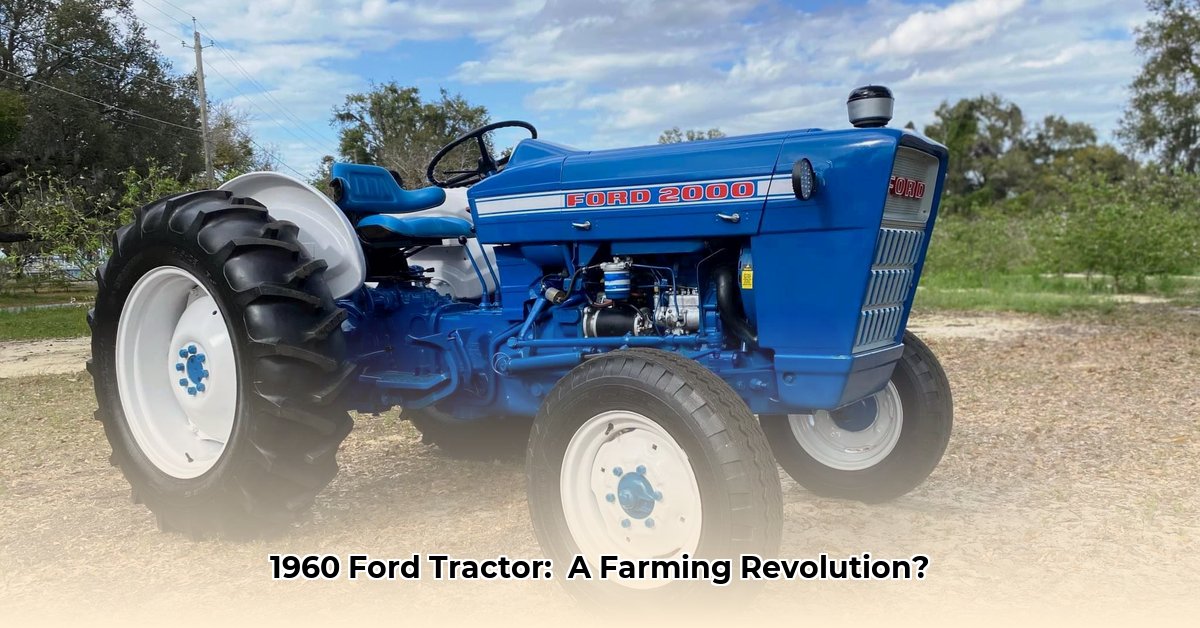
The Iron Horse of the 1960s and its Enduring Impact on Agriculture
Imagine the sun beating down on a farmer's back, the smell of freshly turned earth heavy in the air. Behind him, a 1960 Ford tractor, a robust workhorse of its time, rumbles steadily across the field. This isn't just a nostalgic image; it represents a pivotal moment in agricultural history, a time when mechanization dramatically reshaped farming practices. This article explores the 1960 Ford tractor's legacy, examining its role in the evolution of agriculture and its surprisingly complex relationship with sustainable farming practices. We'll delve into its impact on efficiency, emissions, and long-term soil health, exploring how this iconic machine both advanced and challenged the pursuit of sustainable agriculture. For more on early Ford tractors, see this valuable resource.
The Ford Tractor's Rise and Robust Design
Ford's influence on American agriculture is undeniable. Beginning with the Fordson in 1917, the company revolutionized farming. The 9N, introduced in 1939, further refined the design. The 1960 model, while not a radical departure, solidified Ford's position. This tractor was a testament to its time: durability and affordability were paramount. It wasn't flashy, but its reliability resonated deeply with farmers. Its widespread use cemented Ford’s reputation as a major player in the agricultural industry. But how did this seemingly simple machine shape—and sometimes challenge—the ideal of sustainable farming?
The 1960 Ford and Sustainable Farming: A Nuance Analysis
The 1960 Ford's impact on sustainability is multifaceted and requires careful consideration. While boosting productivity, it also introduced new environmental concerns. Let's examine its strengths and limitations through the lens of contemporary sustainability:
Fuel Efficiency: Compared to modern tractors, the 1960 Ford was a relatively inefficient fuel consumer. This high fuel consumption directly contradicts the tenets of sustainable agriculture.
Emissions: Environmental regulations were far less stringent in the 1960s. Consequently, the tractor's emissions were significantly higher than those of today's machines—a key factor against sustainable practice.
Durability and Longevity: These tractors, renowned for their robustness, often lasted for decades. This longevity, while reducing the need for frequent replacements, presents a challenge in end-of-life management and material recycling.
The Ford-New Holland Merger: A Shifting Paradigm
The 1980s brought a significant shift with Ford's merger with New Holland. While this consolidated the industry, it also led to the eventual phasing out of the Ford tractor line. This transition adds another layer of complexity to evaluating the 1960 model's long-term impact. Did this consolidation inadvertently lead to a diminished focus on environmentally conscious agricultural practices? The question remains a subject of ongoing discussion amongst agricultural historians and sustainability experts.
A Comparative Analysis: Then and Now
| Feature | 1960 Ford Tractor | Modern Tractor |
|---|---|---|
| Fuel Efficiency | Low; High Fuel Consumption | Significantly Improved; High Fuel Economy |
| Emissions | High; Minimal Emission Controls | Low; Strict Emission Standards |
| Durability | Very Durable; Long Lifespan | Durable; Advanced Materials and Designs |
| End-of-Life Management | Simple Disposal; Minimal Recycling | Enhanced Recycling and Parts Reuse; Responsible Disposal |
| Technology | Basic Mechanics | Advanced Technology (GPS, Precision Farming, etc.) |
The Enduring Questions: Future Research and Considerations
This exploration raises important questions about the full environmental impact of the 1960 Ford tractor. While its role in shaping modern agriculture is undeniable, more detailed research is needed to fully quantify its impact on fuel consumption, air quality, and long-term soil health. Researchers are currently using historical documents, engineering specifications, and oral histories from farmers to achieve a comprehensive understanding.
The legacy of the 1960 Ford tractor offers invaluable lessons for sustainable agriculture. By studying the past, we can pave the way for a more environmentally conscious future. The tractor serves as a powerful reminder that progress and sustainability must go hand in hand. Its story prompts critical reflection on efficiency versus ecological responsibility as we strive to create a future where food production and environmental stewardship coexist.